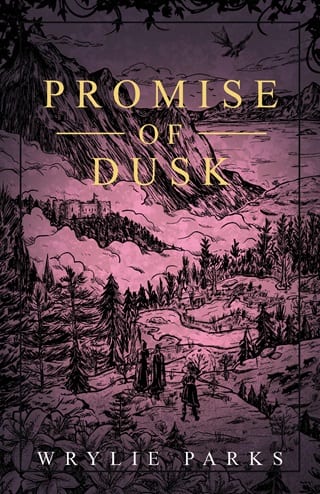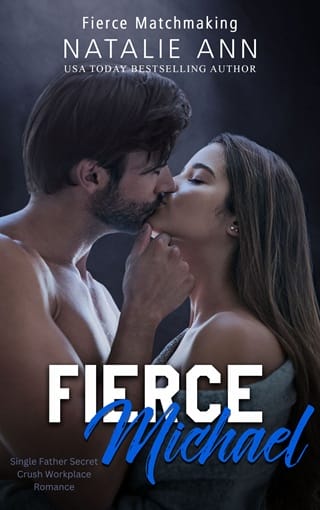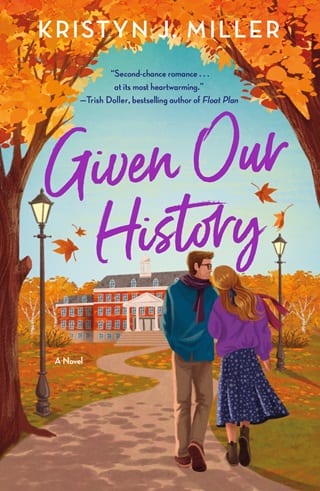Chapter
35
Mariana
Black hair looks ghastly on me. But somehow the darkness feels right as it brushes the skin between my shoulder blades. The cloak to my dagger. Holding onto pride will do me no favors in the mines.
As my cage rattles down the merchant’s road, I fold myself into a tighter ball. The scent of human odors fill my nose; it’s been days in this cage, toiling away in our own waste. The kids have long since stopped crying every time they cannot hold it in anymore. They now stare blankly at the road behind us, their homes and families getting farther and farther away with every roll of the wheel. I hope the feeling of betrayal gets smaller with every roll of the wheel too. The youngest girl, no older than eight, presses up against an older woman I know to be someone else from her village, but not her mother. No, her mother gave her to the Crows.
Children always inherit the consequences of our parent’s choices. For better or worse.
The solitary reprieve from the torment of body and soul comes at the end of the day when we rise on pained joints, released from our pen, and stumble, chained at our wrists and ankles, to the river. Ravenous thirst forces us to press our faces to the surface, gulping down the cold river water like animals, drinking as much as we can before they drag us away moments later. The tiniest of relief from the soul-leeching thirst.
The slavers are servants to no king. They are monsters of a different sort. Those who find their pleasure in degradation of the powerless. Those that take just to rid themselves of the taste of the Crows’ boots in their mouths. Anything to feel power. Anything to feel like someone worth fearing.
With every waking breath, I plot. Whenever my mind strays from my people up in the Ghaels, training, hunting, building, scouting. I think of what I’ll do when a slaver tries to take too much. I think of if I’ll be able to keep my cover. If I’ll take it to avoid the gallows. And I stare and stare and stare at the road as it passes, my dyed black hair hiding my face from curious eyes.
Those scenarios run in my mind until we rattle through the wrought-iron gates in a canyon haunted by the wronged.
Getting here is easy. Though I’m certain leaving may be the greatest challenge yet.
The family thought me an angel. Some black-haired phantom answering every prayer. The proposition was simple: I would take their place in the mines, if they say that I’m their daughter. It took some convincing that I was not here as some sick incriminating torment. A difficult task without divulging many of my intentions.
It took days more for the slavers to show up to collect their payment. And once their debt was paid in my blood and bones, the family of three, a middle-aged couple and the husband’s elderly mother, left with Eldrick to join my people in the Ghaels.
I’ve pondered who they would have sent otherwise. The sole earner of the family, without whom they would surely starve or turn to far more unseemly ways to earn coin? Would the husband send his crippled mother or his wife?
I’m glad none of us had to know the answer.
I look up at the Titans before me, standing indomitable over the mines that we rattle up to—the same mountains that house all I have left. I hope they’re alright. I hope they are getting enough to eat. I hope they are training with Tarrant, learning more than the basic grappling and self-defense we were able to teach them these many weeks on the road. Learning archery and swordsmanship. I’m depending on it.
Our rebellion rests on the backs of stonemasons, butchers, and bakers. And our adversaries are trained monsters, wielding dark power, that want us dead or suffering beneath their boots. We know the extent of their depravity. We don’t know the extent of their advantage over us.
The exchange of a human being is a disgustingly quick thing. They go through their parchments and inspections, seeing if any of us are dead or mortally wounded, give the slavers their payment, and wrench us from our cage.
Chains cut into ankles and wrists, tight for the sake of pain, as we make our way through the camp, passing guardhouses and whipping posts with fresh puddles beneath them. The hauntingly familiar scent follows us as we move further into the camp. It grows greater with every step. The scent of it brings me back to my worst day. The pile of bodies burning could be anyone; the flesh of the dead slaves or those of my father and fallen people in an open field.
The chill of night is just beginning to creep into the canyon after the departure of sunlight. Dirt and rocks cut into my bare feet, growing larger and more jagged the closer we get to the caves. I keep my head low in the presence of leering guards. The Crows have roosts, overseeing the everyday atrocities. The rest of the guards are monsters of the human variety. I can see their differences now, even from the corner of my eyes. The tanned skin from days exacting punishment under the harsh sun.
The slaves on either side of me stumble and retch. The days of starvation and bent limbs exact their price. I feel it myself. Lifting my leg to step is a conscious effort, every placement of my foot is an agonizing submission to my oppressors.
In the end, we are thrown in a shack built into the side of the cliff, beside the entrance to the mines. We stumble about in pitch darkness, feeling our way through smooth wooden poles. I lead the small group of eight new slaves inside. The shack is really just a narrow hallway with slots from floor to ceiling. Cabinets in which to rest. As my eyes adjust, I see the whites of at least thirty eyes peering at us in the silence. Tens of their forms, lying in tiny bunks stacked up to the ceiling.
“Hello?” I whisper finally, the hair on my arms standing up at the unknown people observing warily, silently. Nobody answers my greeting. “Are there any free bunks? Is there anywhere for us to sleep?”
A light groaning of wood is the only reply as one shadowed form sits up slowly and hops down from her bunk a few feet from the ground. A figure watches from the bottom bunk, which is essentially floorspace.
A feminine voice finally answers—the figure who rose from her bunk. “There are a few at the end there. I believe after today there should be seven open. Just find any that aren’t occupied.” A hand gestures to the back of the shack. “If you need to relieve yourselves there is a trench outside, around back. Though I caution against going in the night. The Crows prey on wanderers.” With that, she leads us to the back of the shack. I swear I hear her limbs creak.
The Crows prey on wanderers . I picture the desiccated corpse of my father and wonder what happens to those they ensnare. Are they bound by secrecy? Do they try to pass as humans here as they did in Comraich?
While the others scramble to find their bunks, I sit on the ground, leaning my back against the stone wall at the very end. Best not to get into a fight. Best to win their trust with acquiescence. Every move I make will be crucial in winning their favor. And so I spend the night on the ground, allowing myself this night of restoration.
Tomorrow, the war begins.
My hands are shredded, bloody ribbons of a former life. Callouses from wielding blades my entire life are torn to ruin with every swing of a pickaxe—with every shovel full of stone hefted into carts. Tear tracks run through the dust on my face by the end of every day. There is no end. If you stop, you get the whip; a death sentence. Infections kill faster than the mine collapses or the tunnel fever.
The brutality of this place goes beyond what I had imagined.
Whatever spoiled food would be tossed after the Crows and slavers are done is fed to us in troughs—but not before the floggings. While I ate that first night, I could still feel the spray of blood from those who committed the crime of collapsing from lack of sustenance or water during the day’s work.
Aled once drunkenly touted from his seat at the bar that slaves deserve this for being reckless with their coin. That the mines are a productive way to ensure the repayment of debts—to ensure fairness.
I wish more than my own freedom that he was here, that he paid for those words with his own flesh.
As I endure, I plot. I seek allies in every free moment. I seek familiar faces, hoping and not hoping that I see Alyx. I never do. I watch. I watch the guards and their routines. I watch the other slaves.
I watch Dierdre, the woman who spoke to us that first night. She’s beautiful, with thick, curly hair braided into many long strands. Her dark skin speaks to a heritage across the sea, with freckles painted across her cheeks. Though I know it isn’t her beauty that wins her favor amongst the slaves. I watch the others seek her out, look to her as she laments stories at mealtime. Stories of wicked kings and great flying beasts. Lore of the Reaper, and his ruined face. How he sought great treasures beneath the earth to the east and then fled to the hills to escape what he found. I see her as the pillar that upholds the rest of them. They feed her the best scraps of meat, the softest parts of bread. I realize now how she’s survived for so long, for she’s been here for years. The concept seems inconceivable to me, how anyone can endure this for so long.
So when I sit beside her on the ground during that third day, purposefully elbowing through the others to position myself, I earn glares. I keep my black hair falling over my face and begin picking out the best bits of food from the handful I was able to grab. I feel her eyes fall on me.
My hunger is fierce enough that I don’t look as I shovel my handful into my mouth, chewing and grimacing at the foul texture and flavor.
A chuckle comes from beside me and I turn to Dierdre, laughing at my expense. She says, “Your sense of taste will die off here soon.”
I give her a look of commiseration and say, “I sure hope so.”
She chuckles again before asking, “You hope you last long enough for it to happen?” I nod. “Where are you from?” she asks.
“Comraich,” I reply through mouthfuls of foul food. Something about her warns against lying. Like she sees right through every word, spoken and unspoken. If I lie, I’ll lose her trust, which I so desperately need.
She ponders for a moment. “Wynedd forest? Not a whole lot going on out there from what I hear. Depends on who you ask, I suppose.”
I nod, grimacing at the next horrible bite.
“Some folks came through here a few weeks ago. They said Comraich is nothing but embers now.” Her eyebrows lift in question.
News travels to the mines too, I see.
I give one more nod, looking her in the eyes, letting my grief shine through.
She places a scarred hand on my shoulder for a light squeeze, then goes back to picking at her food.
“Where are you from? Your name is Dierdre, correct?” I ask, playing it like I haven’t had my ears on every word. Her accent gives very little clue as to her home, though I can say she certainly isn’t from around the canyon. The slavers all have a distinct drawl; nobody here goes to school other than the owners of the camps.
The twinkle in her eyes says she sees through me, but she doesn’t comment. “A little town off the coast.” She speaks softly, almost demurely. “I’ve been here for quite a while. Two winters. Two long winters.” She looks into the distance in solemn reminiscence.
“What was your home like?” I ask. People love talking of themselves.
A slow smile spreads across her face. Aglow with memory, even in this hell. “It was… Well how could you not love the place you grew up? I suppose I’m a bit biased.” She chuckles, the sound rich and out of place. “There was something about the sea there. It was always so alive. The tide-pools always had treasures, the sands always had stones of every color. The waves always were the right mix of ferocious and fun. And the markets always full of wonders.” The smile melts, a slow death. “We all grow up. There is less time for treasures and tide-pools. More responsibility. Bad things happen and suddenly there isn’t an adult to run to. My story isn’t really all that unique.” She looks at me now, shared experiences in our eyes. “I could never tell if I was just seeing things for how they always were, or if things had completely changed. It was like the world was angry, the seas became angry, the soil became angry. And it’s been that way ever since.”
I remember that first day the Crows showed in the square. It was as if the clouds covered the sun and it never shone fully again. “You should be a bard.”
Her laugh is booming now, no longer a small chuckle. It draws the guard’s attention. I shrink in on myself, unable to keep the smallest of smirks from my face at her brazen laughter. To hear such a thing in a place like this: it’s like having a butterfly land on you, knowing it will soon fly away, but you still try to prolong it by holding still.
Dierdre is unaffected by the stares as she says, “Now that is rich. I’ll be lucky to make it out of this place alive, but I’ll keep it in mind.” She shakes her head.
“You must be close. You’ve been here longer than anyone,” I point out. I’ve never heard of a soul leaving the mines, but I always assumed it’s because they never lived long enough to see their debts through.
She shakes her head at me with a pitying glance. “Nobody leaves these mines.” She lowers her voice. “Nobody ever sees the numbers. It doesn’t matter how long you stay. It doesn’t matter how minor your debt. Nobody here has a debt that won’t be paid with life.”
I soak in her statement. I wish I could say I am struck by it, but the truth already sat in my bones, waiting to be acknowledged by someone other than my own suspicion. “That’s wrong,” I whisper back, steel in my voice.
She huffs a sad laugh this time, looking at me strangely. “What in this world have you seen that is right?”
Some things. Laughing over breakfast with Mom and Dad. Flames being born from injustice.
I weigh my choices in a moment. I weigh it in the days I have left to spark an uprising. I weigh it in the goodness in her eyes. I weigh it in every day that passes where more and more atrocities are committed. More wrongs that can never be set to right.
From my vantage, I spy a particular white cloth fluttering reassurances high above. A reminder that I am not alone down here. There are others, watching over me.
“It doesn’t have to be that way,” I lower my voice.
She copies my tone. “You speak like that, and you’ll be dead by morning.”
I was expecting the threat.
“Only if you say anything. I hear whispers, Dierdre. Whispers from the mountains. Of something new.”
She doesn’t ask with her words, but with her eyes, though there is little hope there.
“There’s a new player. And if the whispers are right, she would not leave us here. She would never stand for it.”
Her eyes flicker between mine, serious as death. “There is nobody coming to save you. I’m not being mean, I just think you need to see the reality of it. There is no rebel leader from the mountains who will care for your life. None.”
I assess the scales once more.
“You don’t believe that. If you did, you would have died a long time ago. You would have accepted your fate a winter ago. You live—you try to stay alive—for a reason. Because somewhere beneath all of the pessimism disguised as realism, there is a glimmer of hope that you’ll get out of here one day.” I let us both absorb it. “I’ve felt the same. After it all. After Comraich. Before it was ash on the wind, really. That this is wrong.” I gesture to the state of the empire, with a tiny wave of my bloody hand. “And I promised myself I would fight for something more. I was already hanging on for the hope of it. Even after…Even after I knew the cost. And I think you should too, because, if you want the truth of it, I’ve done more than heard whispers.” I implore her to look. “Something is coming. I just need you to hear me and I need you to pay attention. I need you to tell others to pay attention.”
She looks at me now, seeing. I let her see not the poor slave girl trapped in a hopeless circumstance, but the woman who plots and rages against the wrongs.
“Just let yourself hope, just a tiny bit.” I look back down at my messy hands, licking the remnants of food off them, a predator cleaning her paws, grimacing at the dirt that comes up with the grease. I wipe the rest on my tattered slave clothes that barely qualify as clothes.
“You shouldn’t make promises you can’t keep.” All at once she sounds like a slave. Defeated. “And I’ll hate to say I told you so when that day comes. ”
“Just hold on.” I get up and leave her to her people.
They’ll be mine one day too, but I’ll need her help.
 Fullepub
Fullepub 



